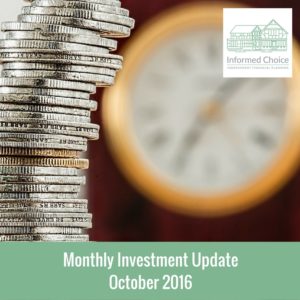 In our latest monthly investment update for October 2016, we look at how the investment markets, global economy and commodity prices are performing.
In our latest monthly investment update for October 2016, we look at how the investment markets, global economy and commodity prices are performing.
The FTSE 100 index of leading UK company shares finished September at 6,919.42 points, up by 137.91 points or 2.03% during the month.
The share index finished a strong quarter on a slightly weaker note, finishing down 0.3% on the last day of month due to uncertainty around Deutsche Bank and falling mining stocks.
Investors have been worried about a $14bn demand from the US to settle claims Deutsche Bank mis-sold some mortgage backed securities. There were some media reports that a settlement which would cut the level of the fine is being discussed.
Mining stocks faced some pressure due to falling oil prices, pushed lower with a stronger dollar and some profit taking after an earlier rally prompted by an OPEC production cut. As a result, the UK mining sector fell by 1.4% at the end of the month, with oil and gas stocks down by 0.6%.
OPEC is reported to have agreed to cut its production output to 32.5 million barrels per day from the current levels of around 33.24 million barrel per day. This would represent the first production cut from OPEC since 2008 and is expected to be formally agreed by each member country at the end of November.
The FTSE 100 index finished up 6.7% over the quarter as a whole. This was the second quarter of gains for the index, with the international exposure of the index and continued weakness in Sterling helping to protect the FTSE 100 from the uncertainty following the EU referendum decision in June.
By comparison, the FTSE 250 index of mid-cap shares, which is more domestically focused, rebounded strongly in the third quarter and finished up by nearly 10%.
There was positive economic news at the end of September, with the UK service sector growing more strongly than expected following June’s referendum result. The services sector grew by 0.4% in July, beating analyst expectations.
Office for National Statistics (ONS) figures also showed stronger than expected economic growth, with gross domestic product (GDP) revised up to 0.7% in the three months to the end of June. The first estimate of economic growth in this quarter was 0.6%. In the previous quarter, GDP was up by 0.4%.
In the short term at least, the decision to leave the European Union does not appear to adversely effected the economy.
UK interest rates were left unchanged at 0.25% in September, following the latest Bank of England monetary policy committee meeting. According to the Bank, “A number of indicators of near-term economic activity have been somewhat stronger than expected,” The chance of a further rate cut, to 0.1% or zero, now seem lower than last month.
Price inflation in the UK fell short of expectations of an increase in August, with the Consumer Prices Index (CPI) measure of price inflation remaining at 0.6%. The ONS announced the inflation rate was the same as that recorded in the year to July, despite widespread expectations of a slight rise due to the weak pound. Rising fuel prices put upwards pressure on price inflation, but this was offset by lower hotel accommodation, alcohol and clothing prices.
House price growth in the UK slowed down in September, with demand for homes fallen. The latest market survey from Nationwide showed average house prices rising by 0.3% in September, to an average of £206,015. This followed a 0.6% rise in August. As a result, annual house price inflation was 5.3% in September, down from 5.6% the previous month.
One casualty of the UK’s referendum on its EU membership has been European equity funds. Redemptions from these funds have approached $100bn since mid-February, with investors nervous about the health of the continent’s financial sector. In the week to 28th September, funds invested in European equities experienced $1.9bn of withdrawals. This was the 34th consecutive week of net outflows for these funds, according to fund flows tracked by EPFR.
US investment markets face the twin threat of a Donald Trump victory in the US presidential election on 8th November, and further disintegration of the European Union. An academic paper published in 2013 found that US equity markets tend to perform better under a Democratic president, despite Republican candidates favouring a low tax, less-regulated economy. On this occasion, the threat of a Republican victory has the potential to upset investment markets, with the narrow lead enjoyed by Hilary Clinton insufficient to calm the nerves of many investors.
Emerging market equities have continued their strong rally this year, with the MSCI Emerging Markets Index experiencing its best quarter since 2012. Risk appetite in emerging market equities is expected to remain strong, with the US Federal Reserve not expected to hike interest rates until December.
The benchmark 10 year UK Gilt yield stands at 0.70% at the start of October; broadly the same as a month earlier and remaining very low.
£1 buys $1.29780 or € 1.15450. The Forex Gold Index is $1,322.50/oz and the Silver Index is $19.35/oz.

